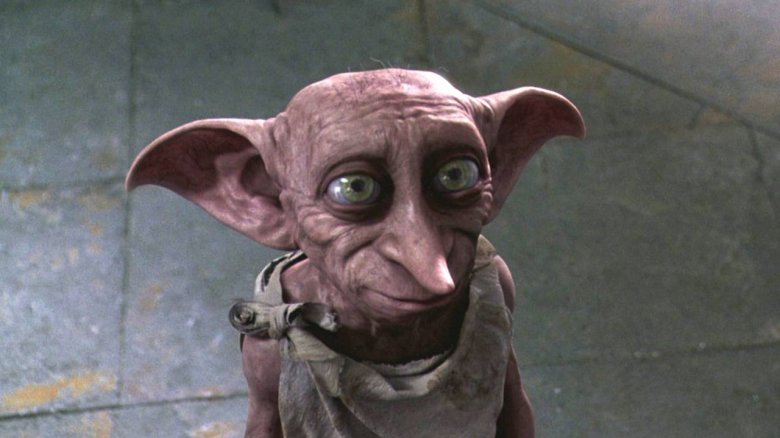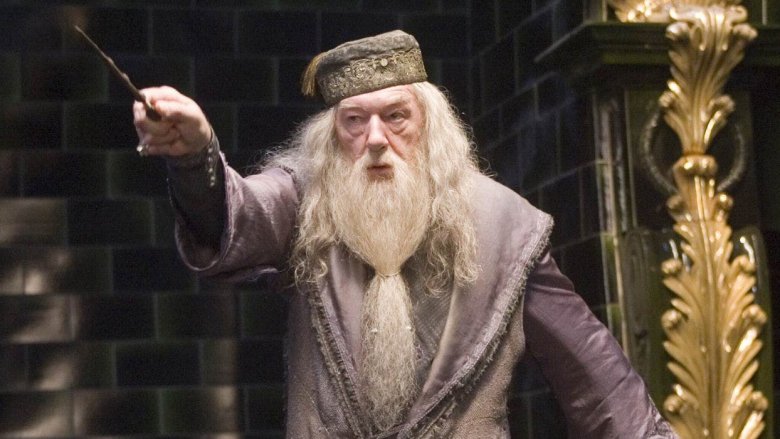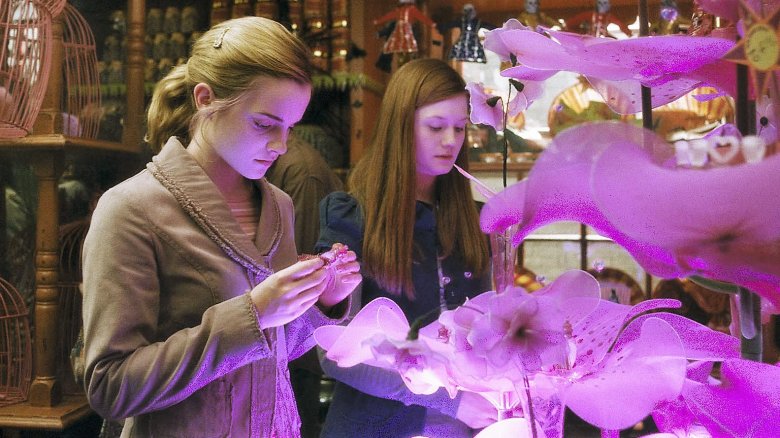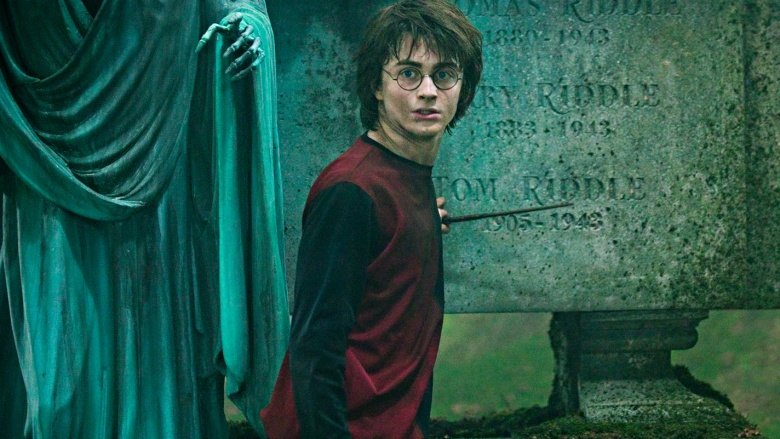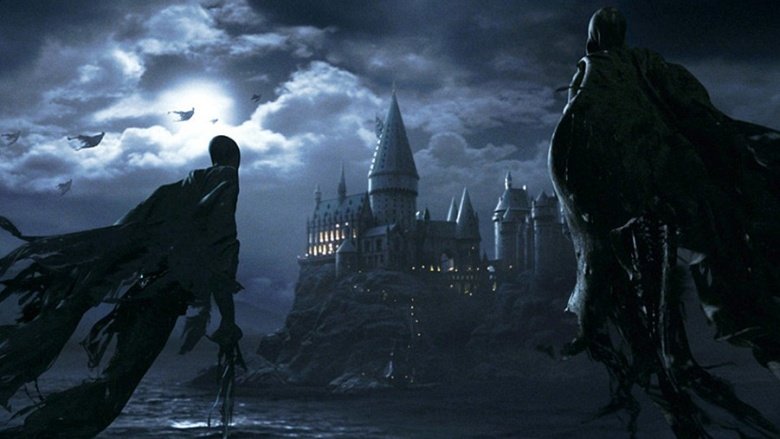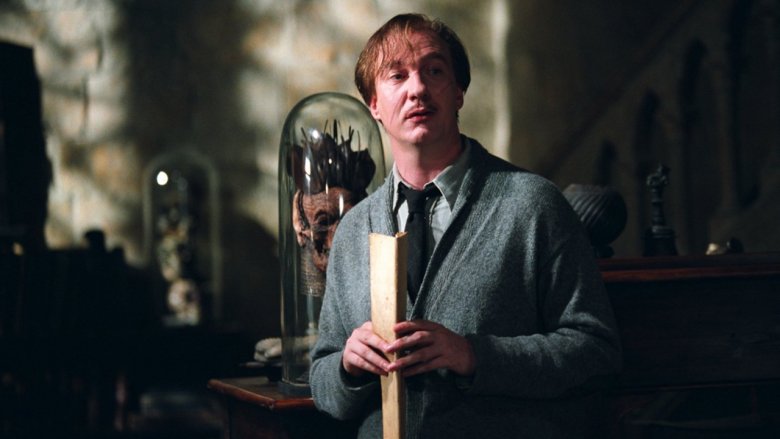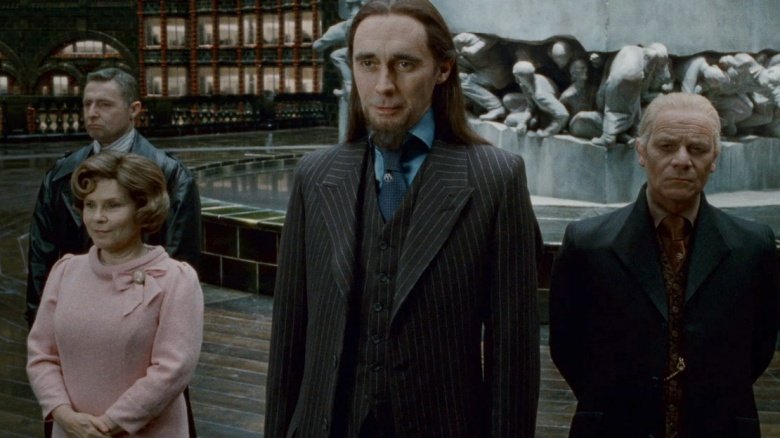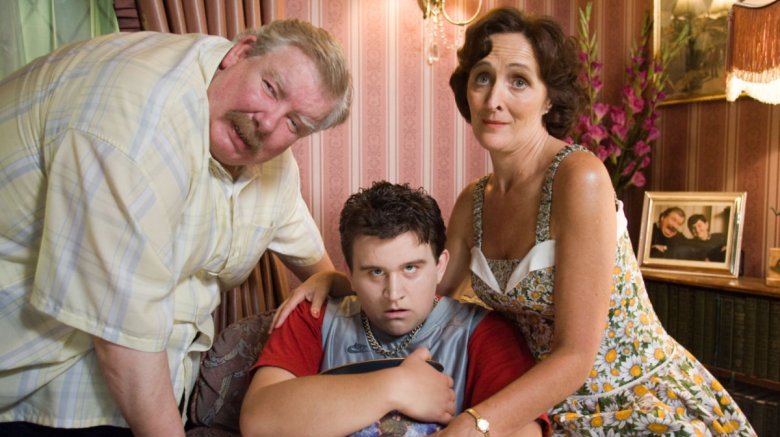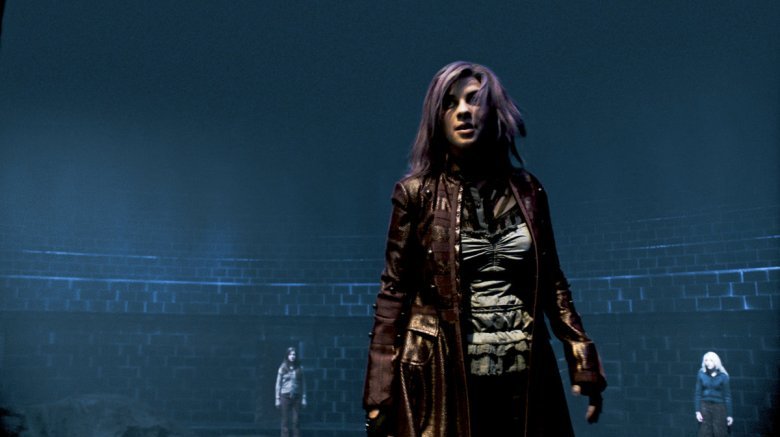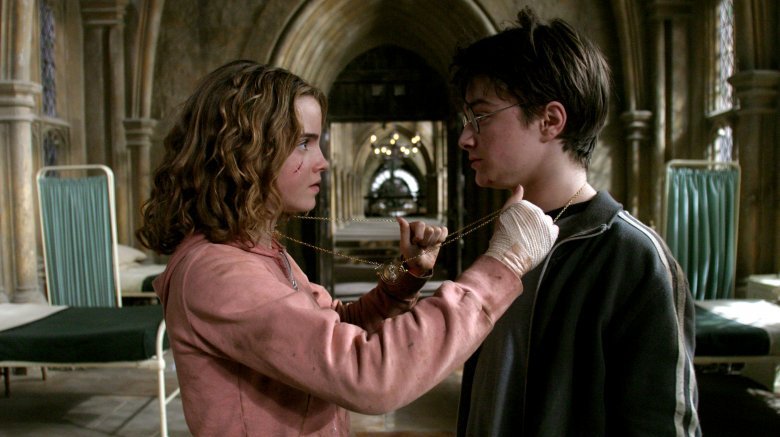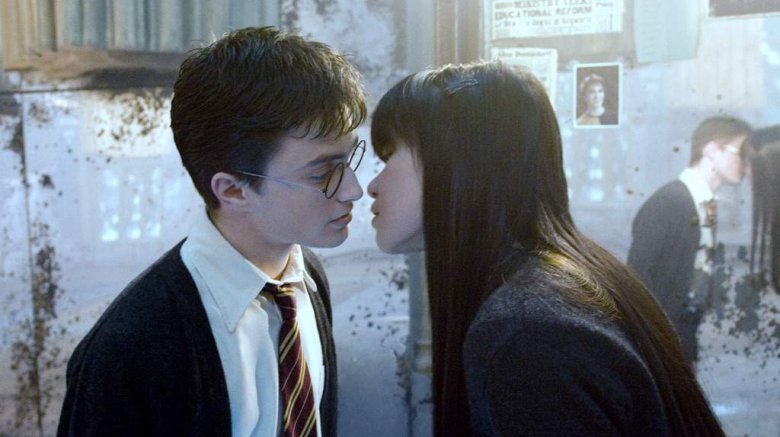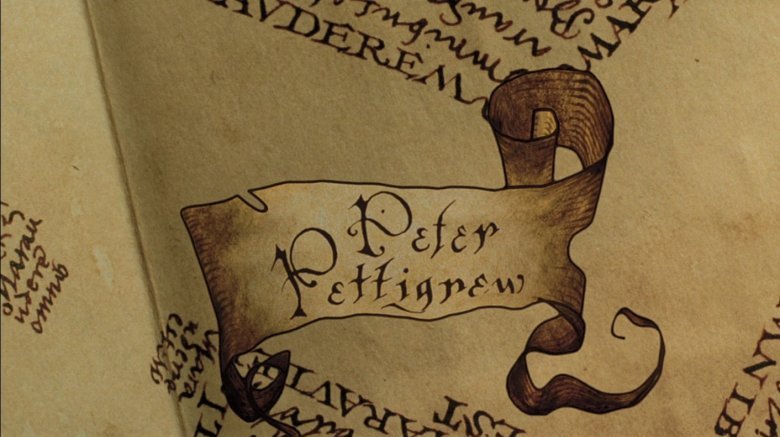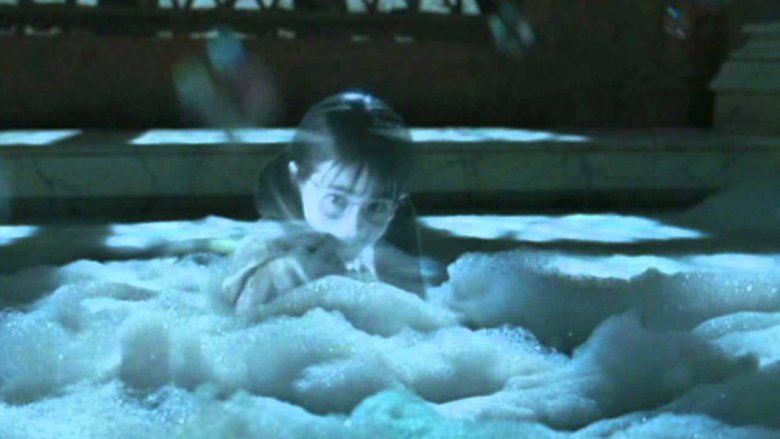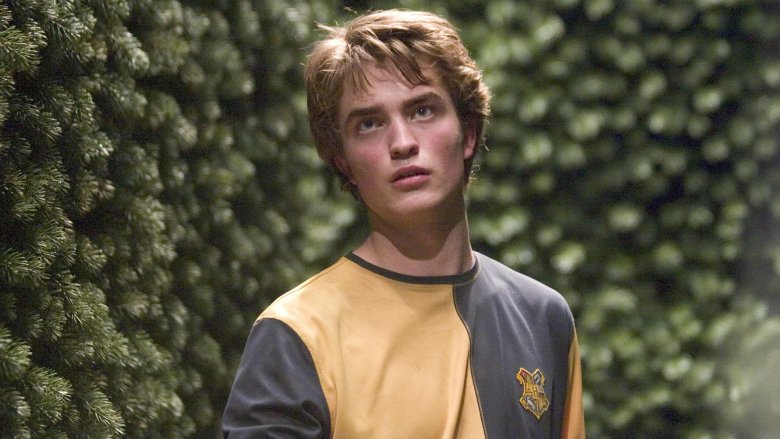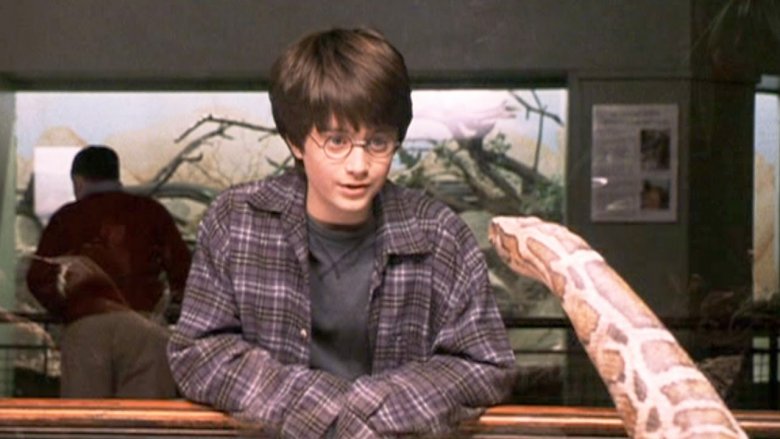Things You Only Notice About Harry Potter As An Adult
Ah, Harry Potter! A whole world of magic and amazement, butterbeer and chocolate frogs. Yes, the Harry Potter universe seems like such a wonderful place—until you really start thinking about it, that is. Like a lot of other popular family-friendly entertainment, this franchise incorporates a variety of elements that could easily sail past the kids in the audience while leaving everyone else wondering if they really just saw what they thought they saw. The series may have been originally written for children, but it quickly transcended age constraints to cast its spell on generations of followers. Yet while some younger readers and moviegoers might be completely under the saga's spell, grown-up fans have a harder time ignoring some of its weird (and sometimes risqué) details. From suggestive names to infuriating character choices, here are some aspects of the Harry Potter series that take on a whole new meaning for adult audiences.
Everyone is totally okay with slavery
The saga of the Harry Potter house elves has got to be one of the series' most disturbing elements. Dobby, Kreacher, and a host of these other big-eyed creatures all somehow found themselves enslaved by members of the wizarding race, and even the most benevolent witches and wizards seem relatively unbothered by the barbarism of that practice.
To make matters worse, it's also unclear as to why any of these powerful mages would even need to have live-in help like this in the first place. The Weasley household gets along just fine without any indentured servitude in sight, since there are spells aplenty to do the dishes and put away laundry and such. However, the Malfoys and even the Blacks have conscripted these poor beings to a life of labor. Once erstwhile outsiders like Harry and Hermione come into the fold and decide to free the house elves from their mystical bondage, it becomes even clearer just how wrong everyone else has been to let these house elves suffer in silence for so long.
Dumbledore is a Machiavellian sociopath
Dumbledore might be the most revered headmaster in Hogwarts history, and he's certainly willing to step in and play father figure to Harry at a time in his life when he desperately needs moral and magical guidance. However, that doesn't mean the character didn't have a tragic flaw or two.
As we find out at the end of the series, Dumbledore knows from the start of Harry's journey to Hogwarts that the kid is doomed to die at the hand of Voldemort. It's simply a part of his fate — part of the prophecy that spells out the Dark Lord's ultimate demise — so he has no choice but to guide this child into becoming the best fighting wizard he can so he has a shot at saving everyone with his self-sacrifice.
That's all well and good (albeit grim), but that doesn't mean he has to send the poor boy into grave danger every single year. From hiring wildly dangerous professors like Remus Lupin to personally ushering Harry into foreboding territories to track down horcruxes and making him sit and watch as his favorite teacher dies right in front of him, well...it's all pretty cruel if you think about it.
Slipping people love potions isn't a big deal
In the muggle world, slipping someone an intoxicating substance without their permission is a punishable offense, especially when it's something that's likely to make him or her more amiable to a person's, shall we say, romantic whims. In the magical realm, however, no one seems particularly bent out of shape about the idea of a wizard depriving another of their free will by way of love potion.
The administration of said spell can be tricky, of course, as Ron Weasley comes to know all too well, but there doesn't appear to be any strict and firm rule against dabbing someone with this magic elixir and making them putty in one's hands and heart. Weasley's Wizarding Wheezes even keeps love potions stocked on their shelves, which indicates that the potion is regarded more as a device of mischief than the very dangerous mind-altering drug that it is. Clearly, even the highly advanced wizarding community has a thing or two to learn about consent.
For a school, Hogwarts makes a great morgue
Parents entrust their children to schools, which are supposed to be safe havens where kids can learn and grow. And then there's Hogwarts, where their motto is: "eh, eff that." It's bad enough that you could get crushed by a troll, impaled by a hippogriff, or eaten by a giant carnivorous spider. At least those would sort of be accidents. But the faculty at Hogwarts goes out of their way to intentionally put their students in danger, like at the Triwizards Tournament, where they use kids as living bait for dragons and mermaids. What the heck are the adults even thinking?
Destroying a person's soul should probably count as cruel and unusual punishment
It's kind of easy to gloss over the implications of the Dementors, but let's take a closer look at these monstrosities for just a moment. So the wizards in the Harry Potter universe have empirical proof that souls exist. And what do they do with this knowledge? They set up a police force consisting of abominations that actually eat your frigging soul. Forget life in prison, or even the death penalty; destroying souls as a form of punishment goes so far beyond cruel and unusual there's barely any words sufficient enough to describe just how downright evil it is. And these are the good guys?
Does Hogwarts even run background checks on teachers?
Werewolves. Killers. Incompetent fools. No, we're not talking about the Death Eaters here—we're talking about the faculty at Hogwarts. You'd think that it would be a pretty high priority to keep these kinds of dangerous nuts away from students, but Dumbledore and the school board actually do exactly the opposite, making one insane hire after another to fill their open teaching positions. Just more evidence that Hogwarts is the worst school in the universe, magical or not.
The Ministry of Magic is a fascist dream
If the Dementors seem like something out of a fascist Orwellian nightmare, there's good reason for that: because that's exactly what wizarding society is. Forget Big Brother watching you; thanks to magic, the wizarding government can literally see and hear every single thing you do. And they are keeping very close tabs; remember the notice Harry receives for underage use of magic? How about the Marauder's Map showing everyone's location and activities at all times? People apparating at will into your living room—or bedroom? There's no such thing as privacy in the Harry Potter universe. And that's just how the Ministry of Magic likes it.
The fat-shaming was fierce
It got some laughs out of a lot of readers, but the way J.K. Rowling wrote about Dudley Dursley in the earliest installments of the Harry Potter series was quite troubling. Although she had plenty of faults to choose from while writing about Harry's spoiled cousin, she paid a lot of attention to the fact that he was portly—or, as she wrote it, "the size of a young killer whale." Descriptions of Dudley's "piggly little eyes" and his resemblance to a "pig in a wig" read as especially cruel and unnecessary in retrospect—even if Rowling has insisted she's against fat-shaming.
Sexual innuendos were everywhere
The Harry Potter series was massively popular with kids—so it may come as some surprise that certain aspects of the books seem a little NSFW upon review. For starters, there's the "engorgio" spell, which just screams double entendre (and seems to be the only explanation for how Hagrid's father made whoopie with a giantess).
Then there's the fact that these are all teenage students who have no sexual education coursework at all, and some have traced the timing of Nymphadora Tonks' conception to her parents' teen years (giving her already suggestive name even more significance). Rowling herself has said she didn't mean to encourage teen pregnancy in the story, but thanks to a dirty Easter egg in the Marauder's Map from the Prisoner of Azkaban movie, which showed two students getting busy in a corner, we know Hogwarts could get pretty steamy.
People really wasted their talents and tools
As creative and thorough as Rowling was, there were some aspects of the stories there were pretty frustrating in hindsight. Snape had the gift of legilimency, for example, but didn't bother using it to figure out Bartemius Crouch Jr. was using polyjuice potion to disguise himself as Mad-Eye Moody in The Goblet of Fire (which cost the life of poor Cedric Diggory). Hermione's time-turner could've been used for far more important things than overloading her school schedule and springing an animal from execution. Harry could've probably used that luck potion for the grander picture of defeating Voldemort. And Minerva's shape-shifting skills should've given her an upper hand in undermining Dolores Umbridge, who just so happened to be a sucker for cats. Instead, all of these elements just came and went unceremoniously during more trivial moments of convenience, despite the fact that there was an all-out war in motion. And let's not forget how casually Dumbledore gifted Harry one of the three sacred Deathly Hallows—the Cloak of Invisibility—long before he could come anywhere near appreciating its true value.
Harry Potter was kind of a skeeze
Whether or not it was within the bro code for Harry Potter to hook up with Ron's sister Ginny, he was still kind of a jerk when it came to his decision to move on Cho Chang in The Order of the Phoenix. Cho had been in a relationship with Cedric Diggory in The Goblet of Fire, and after he died, she was pretty broken up about it. Instead of considerately consoling his friend, whose boyfriend's body he'd literally held in his arms, and giving her time to grieve, he maintained his initial interest in courting her. Sure, she had some feelings for Harry, too, but that kiss shouldn't have happened. It served him right that he didn't get to enjoy it because of all the tears she was shedding for her lost beau at the time. Gross.
The Weasley twins were weirder than they seemed
In The Prisoner of Azkaban, the Dark Lord's sniveling sidekick Peter Pettigrew was eventually spotted alive and well on the Marauder's Map that Fred and George Weasley had been holding onto, which is how he was ultimately discovered to be disguised as Ronald's "pet" rat Scabbers. But if he was visible on the map, and the Weasley twins had full access to it—and, in theory, would check in on their younger brother once in awhile—they had to know he had unexpected company in his room each night, and just ignored it. The Weasley twins might've seemed like feel-good pranksters, but that's way more messed up than inventing mischievous items like U-No-Poo and anti-gravity hats. Looks like they made good on their oath to be up to no good.
Moaning Myrtle was a perverse poltergeist
Ah, Moaning Myrtle. Her situation is certainly not enviable. Just as the basilisk gets loose from the Chamber of Secrets and starts stunning students into a petrified state — somehow, Colin Creevey, Hermione Granger, and others just so happened to be looking through lenses when they encountered the scaly beast — we find out that the bathroom-dwelling poltergeist Myrtle wasn't quite so lucky and lost her life upon catching the serpent's visage.
That said, her (literal) sob story is no excuse for how she tends to treat the living. Sure, she might get lonely, since kids largely stay away from her bathroom. But she has a strange tendency to play peeping Tom on any of the boys who dare to come into her washroom. Both Cedric and Harry suffered her prying eye — and no, it doesn't make it any better that she helped them resolve the mystery of the Golden egg. What's worse is that her name takes on an all-new meaning when you consider her twisted tendencies. To think — this is a kids series.
Hufflepuff sounds like a stoner house
The Harry Potter series was never shy about its professors puffing on pipes or taking potions that would help enhance their abilities or mindset. So is it too far of a stretch to interpret the Hufflepuff house as one that might consider April 20th an annual holiday? After all, the kids that were often sorted into the house were some of the most serene and blissful students of the Hogwarts bunch, and they often excelled at the study of Herbology.
Yes. Herbology.
They also loved to laugh, and their house was located with prime access to the kitchens, which meant midnight munchies were just a wand's throw away. And considering how much thought and cultural meaning author J.K. Rowling put into every single syllable of her proper noun array, it hardly seems like a coincidence that the very title of the house sounds like some kind of whimsical euphemism for, well, herbology.
Animals are people too. Little, furry, expendable people
Many muggles might treat their four-legged friends like they're just wordless fur babies who have just as much emotion and integrity as us two-legged types. But in the world of witchcraft and wizardry, that actually is the case with animalia. From the get-go, we learn that animals are indeed anthropomorphized, with Harry's genetic gift for parseltongue revealing the bored soul of the zoo snake.
Then we meet the giant spider Aragog, who has true feelings of loyalty and friendship for his former caretaker, Hagrid. There's also the giant dragon, who seems to be able to intuit the good guys from the bad as he lays waste to Gringotts Bank and gives the trio a lift to safety. Even those animals whose souls are apparent are still special — for example, Hedwig might not talk to Harry, but she sure does have a knack for following his verbal orders. So, it's a little weird that most of the series' animals are still treated like, well, animals, while Hagrid is largely considered a gentle weirdo for getting so close to his pets.
